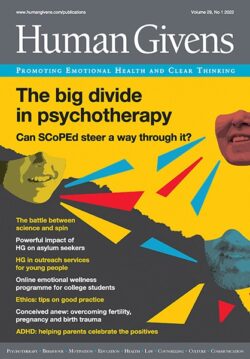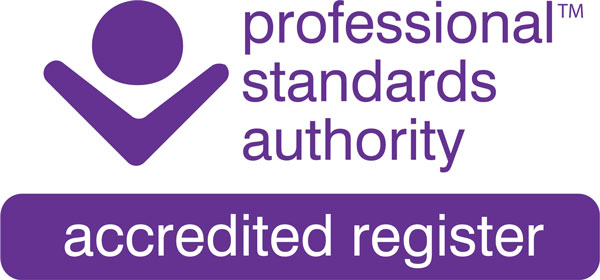Inside our ethics committee
Monique Nauta, co-chair of the HGI’s Registration and Professional Standards Committee (RPSC), shares important information and also learning points from cases presented within the past year for adjudication or advice.
PSA public interest test
To meet PSA requirements for our reaccreditation each year, HGI, along with all the other registers, now has to satisfy a new ‘public interest test’. This means supplying evidence that the work our practitioners carry out is beneficial to the public; any harms or risks are justifiable and mitigated; and any treatment or service we offer as practitioners is not misleading.
Gareth Hughes, director of education for Human Givens College, took the lead on this work. As part of it, he provided a summary of the peer-reviewed and large-scale studies that have to date been carried out, showing that sessions conducted by HG therapists are safe and effective in real-world settings. (These studies can be viewed at here.)
He also referenced HG training methods, including the addition of the detailed practice and feedback week, which now comprises Part 3; CPD that is geared towards development of skills and consistence of delivery; and our code of ethics.
At the time of publication, this year’s PSA submission is still ‘a work in progress’. It should be to our advantage, however, that, as a routine part of the reaccreditation process, we are already obliged to submit forms recording any adverse impacts of our therapy, and we have never had any to identify.
Need for an enhanced DBS check
We have had a few queries over the year from practitioners unsure whether they need an enhanced Disclosure and Barring Service (DBS) certificate to work with young people. The guidance is that, if you are working with anyone under the age of 18 or with vulnerable adults (even just once), you need the enhanced DBS certificate. However, practitioners cannot apply for an enhanced DBS check as individuals; they have to be sponsored by an organisation. This may change in the future but currently you have to ask an organisation to make an application on your behalf (charities are amongst those that can do this), and you need to supply them with all the required documentation. This service is unlikely to be free! Contact Andy Tarrant, RPSC coordinator, if you want advice on how to go about this.
Can young people be made to have therapy?
The HGI holds that a child or young person cannot be compelled to have therapy. Young people over the age of 16 are entitled to consent to their own treatment. If you are going to work with someone younger, we still advise getting consent from both the parent/carer and the child. Even if technically consent only from the parent or carer is required, ethically this is not satisfactory.
Some practitioners may feel uncertain what to do, in the child’s best interests, if the parent says, “My child doesn’t want therapy. But I know about the HG approach and I know they will change their mind if you see them just once.” However, this is not a good place to start from. Better to invite both for a discussion, explain how you work and what you can offer, and then ask the parent to leave the room and give the child the chance to decide whether they wish to go ahead or not. The child will feel that they are being taken seriously and this, in itself, may encourage them to give the therapy a try.
Disclosing and redacting notes
Practitioners may be asked to disclose clients’ notes in relation to court proceedings, particularly over familial matters and custody hearings. You need your client’s consent in writing and you need to redact any information that will contravene requirements about protecting personal data and lead you to fall foul of the Information Commissioner’s Office. So, if a client referred during a therapy session to a person unconnected with the case, and, although unlikely, you had reason to record that person’s date of birth or address, you would need to redact that information.
You are required only to produce your notes, so do not feel bullied into writing a ‘report’ that may be beyond your expertise. In a recent case, we had to advise a therapist who was being pressurised by a solicitor to complete a full report of their assessment of their client’s background and mental capacity, to be presented in a family court – a report which they were neither accredited nor trained in to produce. You are under no obligation to provide a report, which could be used and placed in front of a court. However, if the client gives their written consent, you do have to supply their notes. If you have to transcribe from scribbles or shorthand, you can make a ‘reasonable charge’ for doing so, although definition of reasonable is likely to vary widely! Sometimes the solicitor may pass your charge on to their (ie your) client, so you will need to check this out in advance, if you prefer for that not to happen.
What not to put on your website
It is important not to make or refer to statements that you cannot substantiate. For instance, don’t state an opinion or link to information claiming that certain treatments are unsafe, as that may deter a person from continuing with or starting any treatment. Always avoid making unwarranted claims about your own services. It may be your personal website but, if it is being linked to from the HGI and you want the kudos of HGI and PSA logos, you need to follow HGI rules. You may also find that, in the event of a complaint made against you in relation to the statements, the HGI will not be able to offer you support.
Committee coordinator Andy Tarrant is always happy to give advice on any of the above issues – or others related to good practice.

Monique Nauta is co-chair of the HGI’s Registration and Professional Standards Committee (RPSC)

This article first appeared in the Human Givens Journal – Vol 29, No. 1: 2022
Back issues available – each issue of the HG Journal is jam-packed with thought-provoking articles, interviews, case histories, news, research findings, book reviews and more, with no advertising. If you find the articles, case histories and interviews on this website helpful, and would like to support the human givens approach, you can buy a back issue today, they’re available in PDF and print format.

